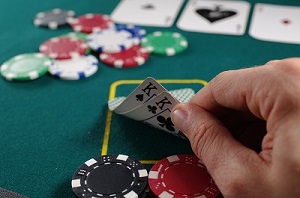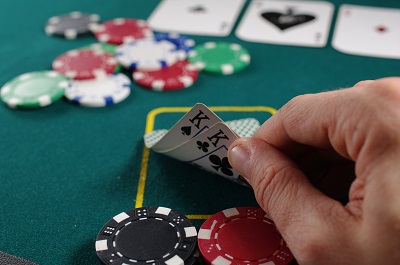How bad could it possibly be to wish people around the table good luck? Well, in the world of poker, players are known to be very superstitious.

Poker is equally a game of skill, luck, and deceit. Saying “good luck” can come across as mocking your opponent, challenging fate, or alluding to the fact that you’re hiding an ace in your sleeve. Literally.
Wishing someone good luck in poker is a tricky thing, as it can quickly come across that you don’t take your opponents seriously. “Let’s have a good game” is a good alternative, which avoids the term luck and is also suitable for unknown players.
Classify the Characters and Circumstances
Even if you’re sitting down with 3 of your friends, you have 4 players with 4 different playing styles and views of the game. Things become even more interesting when you play with absolute strangers.
The first moments after you enter the venue are extremely important. Don’t waste those few precious seconds admiring your friend’s mancave or the furnishings of the casino.
Instead, use this time to gauge if the players are relaxed or are there tension in the air. Relaxed people are easier to talk to and you will not have to worry too much if you’re stepping on any toes.
Different Types of Poker Players
There are different characters among poker players, and each of these characters reacts differently to wishes of good fortune.
Therefore, it is helpful to quickly classify each player into one of these categories so that you can address them accordingly.
1. The desperado
This is the person that is taking the game a bit too seriously. They are here to make money, they might be in debt, and they may even have a gambling addiction. They will not leave the table a winner because this game demands a cool head.
This is the person who will have the thinnest skin and whose nerves are already overloading.
They may even go out of their way to be insulted by anything you say or do. There’s not much you can do about that, outside of not antagonizing them on purpose.
2. Mr. Moneybags
Some rich people list poker as their hobby. They fall into two groups: those who think they are good at it, and those who don’t care if they are wasting their money or not.
Mr. Moneybags will not shy from both telling and showing you how rich they are.
And it may not be as subtle as noticing that their quality sunglasses or watches that you don’t know the name of the brand but you just know they cost as much as a car.
Take an extra moment to study our Mr. Moneybags because they could go either way.
They can be very cool and relaxed throughout the game (because it simply doesn’t matter if they win or lose), or they can get insulted by a mere suggestion that they are not as good as they think.
3. The shark
This is the person who knows the game. They will probably walk away with the pot.
The only thing you need to look out for (outside of the fact that they will clean you out) is for signs of superstition.
It’s very rare because these people are usually crystal clear thinkers. However, everything is possible.
4. Who’s the dark horse?
This is a curveball. Some players act like fools or complete newbies to distract other players. When everyone has their guard down, they collect the pot and walk away victorious.
They should probably not be easy to offend because they have to keep the mask on at all times.
But is that silly, giggly person a real fool or a shark in disguise? Well, you’ll learn by the end of the night.
Best Poker Success Wishes
Now we know the type of people we may be dealing with, we have a clearer picture of how we can trigger them. Let’s dive straight into ways to say good luck and start the game on a good foot.
Keeping it old school
“Good luck, everyone. Let’s have a good game.”
Sometimes, a simple solution is the best. However, you have to watch your tone. It should not sound like, “good luck because you are playing against me”. Not only is this rude, but it may work against you at some point in the game.
Try not to keep eye contact with anyone in particular when you’re saying this. Keep your eyes on the cards.
In case that you do end looking directly into a certain player’s eyes, your words could translate to “I’m going to beat you”. Again, very rude and may come back to bite you.
You should, however, make eye contact when wishing everyone to have a good game. That will make it sound like you truly mean it and wish that everyone has a good time that evening. A soft smile will not hurt either.
The Scottish play
“Everyone, break a leg. Let’s have a good game”
Blackadder fans might now have a flashback to the ritual actors would have to perform every time Rowan Atkinson will say, “Macbeth”. It may look exaggerated, but it’s not too far from the truth. People take their superstitions very seriously.
You know where you stand when you’re playing with your friends. But you may want to put in some work into figuring out if there are a lot of superstitious players when you’re hosting or playing poker with strangers.
Sometimes, this is not an easy job. Not everyone will be completely honest and talk openly about the lucky underwear they wore fore for every single game since they started playing poker.
This can be a safe default, especially when you don’t know anyone at the table.
Just keep in mind that this particular wording may send another player a cue that you are the superstitious one. Feel free to use it to your advantage if you wish.
Sharing is caring
“Here’s my lucky coin. Let’s all give it a rub and have a good game.”
This is also a very good way to put a mask on for the other players. At least, it’s a good way to start on a light note.
Make sure you are using a tone of voice that communicates that it’s just a bit of fun. That way you will not offend someone who is truly superstitious and will not annoy super serious players.
Sometimes a bit of humor goes a long way to set the mood for the evening. But you have to be very careful about your tone and how far you’re willing to take it.
When you go out and see a stand-up comedian, you more or less know what you are getting yourself into (especially if they are famous for controversial topics). Regular people are different. Even with your friends of many years or decades, you still need to keep an eye on their bottom line.
When playing (and joking) with strangers, it’s vital to start conservative and see how the crowd reacts.
Also, know that if trying to be more jovial is not working, you should dial it down. Don’t call them out it saying something like, “someone is a sourpuss” is not only rude but it also makes you appear very immature and even self-centered.
The quiet observer
“Good luck and have fun.”
You may find yourself not a part of the game. You are probably hosting or working on the sides.
It’s best to not insert yourself further and only throw in a quick greeting and those few words above.
Make sure you make eye contact with everyone equally so you don’t give out an impression that you favor one player over others.
The first and the second statement from this list will work as well, especially if your job is to deal cards. In essence, you are the House and you have the stake at the table as well.
As long as you remember not to give preferential treatment to anyone, everything should go fine.
But if you don’t have a seat at the table, be also careful of interrupting the game. Try not to bring anything to it unless someone is asking for it directly. It’s not just about being polite and leaving players alone, but it can also look very erratic if you hover too much.
The power of silence
“Let’s have a good game.”
We should expand the saying “if you have nothing good to say”. It should go also “if you have no good way of saying it, keep quiet”.
You should avoid mentioning luck in any way, shape, or form in a tense room.
And it may not have to do a lot with superstition either.
A tense room is usually filled with people who are taking this game a bit too seriously. The stakes are probably very high, and not only in terms of the money on the table. Anything you say or do can (and will be) used against you at some point.
It may even be a good idea to walk away from such a tense game as soon as possible. It would be rude to pack up and leave straight away, so it might be a good idea to play a few hands first.
Try not to lose too much money, of course, but you can use that loss as your reason for leaving.

Sophie Hammond is a journalist, psychologist, and freelance speechwriter for people in politics and business. She lives on the edge of the Rocky Mountains with her dog and a lifetime supply of books. When she’s not writing, she can be found wandering through nature or journaling at a coffee shop.

